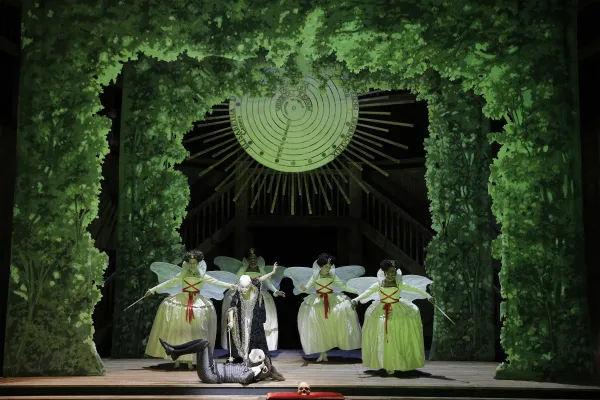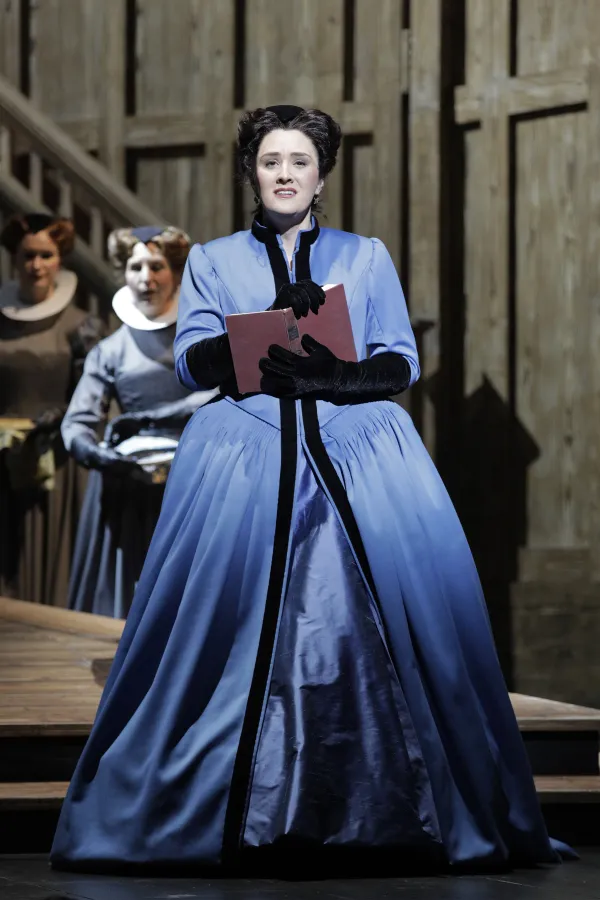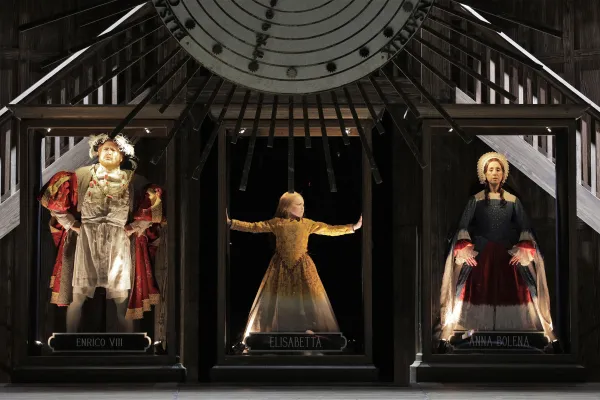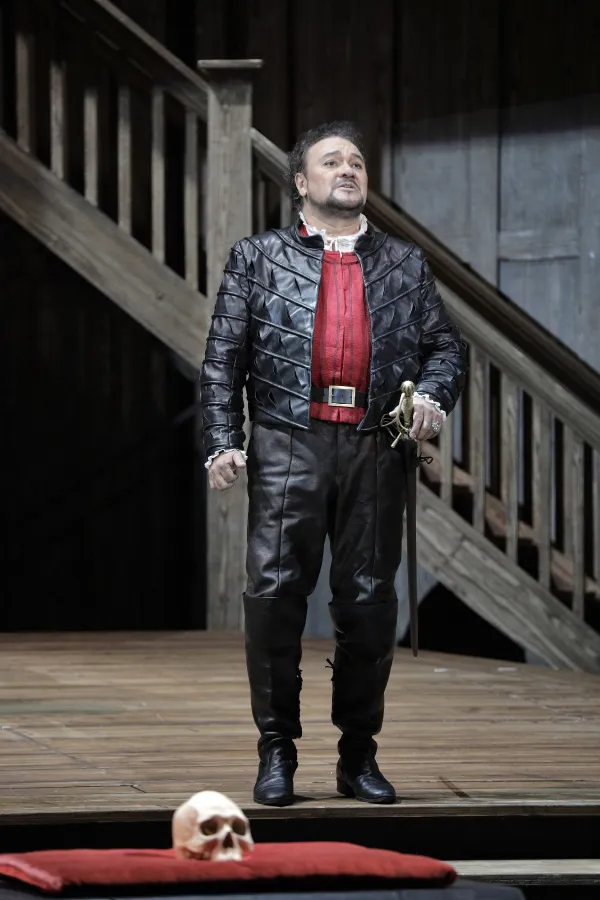Move over Broadway’s recently opened musical adaptation of the 1960s’ wife-swapping movie Bob and Carol and Ted and Alice, which has nothing on LA Opera’s premiere of Gaetano Donizetti’s opera Roberto Devereux about the 1600s’ kinky hi-jinks of Bob and Liz and Sara and Duke. To be more specific, I’m referring to the ménage-a-quatre (to coin a phrase?) between the titular character, Roberto Devereux (aka the Earl of Essex), Queen Elizabeth, Sara (the Duchess of Nottingham) and the Duke of Nottingham in Elizabethan England.
Donizetti’s tragedia lirica (tragic opera) with Salvadore Cammarano’s libretto, first produced in 1837 at Naples, is loosely based on at least one play and a publication about actual historical personages. This is one of Donizetti’s works depicting England’s House of Tudor, which include the Italian composer’s operas about Anne Boleyn (King Henry VIII’s doomed wife is alluded to in Roberto as she gave birth to Elizabeth) and Mary, Queen of Scots.
Film fans who have seen director Michael Curtiz’s 1939 The Private Lives of Elizabeth and Essex, starring Olivia (not Colman!) de Havilland, Bette Davis as the not-so-Virgin Queen and Errol Flynn as the Earl of Essex will be familiar with some of Roberto Devereux’s hanky-spanky plot points. In the Warner Bros. Technicolor epic Our Man Flynn puts the sex into Essex as he romances the much older Queen Elizabeth I (not the current British monarch - she isn’t that “olde”!). (BTW, Private’s musical score by Erich Wolfgang Korngold - one of Hollywood’s greatest movie score composers ever - was Oscar-nominated and he later used part of the picture’s composition in his “Symphony in F Sharp Major.”)
Meanwhile, back at the opera review:
As the 2020 season continues, LA Opera is rolling right along, despite conundrums that might cause serious setbacks to other lesser opera houses. Not even LA Op’s loss of Placido Domingo as a general director and performer (he had been scheduled to appear in Roberto) has broken the company’s stride or spirit (BTW, Domingo’s precipitous fall from grace is the stuff great opera is made of).
On Roberto’s opening night, LA Opera was faced with another crisis when one of its female leads was unable to take the stage. With that “the-show- must-go-on!” pizzazz, before the curtain lifted Feb. 22 on the Dorothy Chandler Pavilion’s stage, LA Opera CEO Christopher Koelsch announced that due to Davinia Rodriquez’s illness - which reportedly prevented her from playing Queen Elizabeth - Washington state soprano Angela Meade would replace the Spanish soprano in singing the royal role. Because of Ms. Meade’s late addition, as well as the extensive demands of the role, at the premiere of Roberto Devereux Ms. Meade sang the role of Elizabeth from the side of the stage while Nicola Bowie, the production’s choreographer, acted the role in costume and makeup onstage, a practice which - according to LA Op’s Director of Communications - shall continue throughout the show’s run.
Antennas raised, I was curious how this rather unique arrangement would work out under the glare of the operatic medium, live? Would it look like kooky kabuki theatre? While Ms. Bowie played the Virgin Queen center stage, Ms. Meade was visible singing on stage right standing in front of a music stand with a libretto, illuminated by a light. Instead of ruining the performance, this arguably enhanced the experience with a rather singular mise-en-scène. It called to mind the scenes depicting the introduction of synchronized sound to “talkies” in Singin’ in the Rain (La Mirada Theatre recently won Ovation Awards for its stage version of the 1952 Gene Kelly musical), as well as Deaf West Theatre’s use of sign language during plays and musicals (this March DWF is performing an iteration of Jean Cocteau’s Orphée at the Odyssey Theater).
Be that as it may, with Mexican tenor Ramon Vargas in the title role as the dashing, younger nobleman and soldier, Roberto Devereux dramatizes his affair with Her Majesty, while he’d clandestinely romanced the Duchess of Nottingham, Sara (Georgian mezzo-soprano Ashley Dixon plays the part until March 5, while fresh off her portrayal of Big Stone in LA Opera’s Eurydice, Texan mezzo-soprano Raehann Bryce-Davis assumes the role of Sara March 8-14). To further complicate the infidelities, Sara is married to Roberto’s best friend and loyal champion, the Duke of Nottingham (Hawaii baritone Quinn Kelsey in his La Opera debut).
To say that complications ensue is an understatement. Compounding all this hanky-panky, Roberto is charged with high treason due to his actions on the battlefield (not in the bedroom). This critic has often remarked at how uncanny it is when, as often happens, art so closely mirrors reality. Perhaps it is just coincidence or your humble scribe is reading into things, but the dramatization of a traitor’s trial very shortly after America underwent an impeachment and Senate trial of the U.S. President is quite remarkable. Will the Earl of Essex end up with his head on a pike or, like Emperor Trump, will he escape the chopping block (at least for the time being)? Inquiring minds want to know, but unlike the blabbermouth movie reviewers on KPCC radio’s “Film Week” program on an L.A. NPR station who disclose plot spoilers on the air as often as Trump dispenses pardons to his cronies, I won’t spoil the surprise and joy of discovery for you, Dear Reader.
And with its stellar stagecraft I do indeed heartily recommend that opera goers see, hear and enjoy Roberto. The optical opulence of Belgian Benoît Dugardyn’s scenery evokes 16th century London, as the designer puts his architectural background to good use, creating a set reminiscent of Shakespeare’s Globe Theater (the Bard himself makes a cameo appearance onstage). Without revealing details, the first and last scenes visually express Elizabeth’s angst, caused by having the institution of the monarchy thrust upon her. As Shakespeare observed in another meditation on monarchy, Henry IV: “Uneasy lies the head that wears the crown” - and heavy is the heart that must bear it. Not to mention the multitude of subjects who must suffer under a ruling class that inherits privilege and power to reign - along with the megalomania and affluenza in exercising their royal rule.
For this production, LA Opera’s curtain looks like a gigantic picture frame, which is highly apropos, for along with spot on makeup and wigs, German costume designer Ingeborg Bernerth’s apparel for Ms. Bowie as Her Majesty closely resembles contemporary paintings of Queen Elizabeth I. The royal raiment brings alive the court, as well as parliament, of Elizabethan London, transporting us all back in time and to another place - if only for three hours or so. But this production is such a magical time machine that H.G. Wells might envy it.
In addition to the unusual dual performance of Madames Meade/Bowie as Elizabeth, LA Opera audiences are treated to another rare occasion, as a female conductor, South Korean Eun Sun Kim, “Seoul-fully” wields the baton, eliciting Donizetti’s sometimes soaring score from the LA Opera Orchestra (New Yorker Louis Lohraseb conducts on March 14). In this age of cultural authenticity, perhaps it’s on point to have an Englishman direct this production set in Britain, LA Opera veteran Stephen Lawless, who flawlessly oversees this brilliant production, not withstanding that last minute hiccup re: casting. The cast outstandingly sings and acts, with Kelsey’s Duke movingly emoting as not just a cuckold, but as someone who believes he’s been betrayed by his besty, whose head he’s been trying to save in the corridors of power.
Overall, in addition to Roberto’s musings on and depictions of its four main characters’ sexual peccadilloes, along with LA Opera’s stellar cast and crew, Donizetti and Cammarano have also rendered an anti-monarchical masterwork, which - unfortunately - remains as relevant today as it was when the story was set, in the 16th century, and when first produced in 1837. Today, as authoritarianism, one-person rule, and leaders acting as if they are above the law threaten us anew, Roberto Devereux remains a cautionary tale.
The opera’s traitor’s trial is a stark reminder of the treasonous trials and tribulations we continue to confront in the face of a totalitarianism rearing its ugly head once again. What an opera the Trump saga will make one day - but who knows when and what its grand finale will be? Will the not-so-loyal subjects rise up and cry: “Off with their heads!” in the denouement? Or will we return to a 21st century version monarchy - as the final curtain falls on democracy and liberty? In any case, one thing’s for sure: It will be a combination of tragedia lirica and opera buffa.
Roberto Devereux is being performed Thursdays Feb. 27 & March 5 and Saturday March 14 at 7:30 p.m. and Sundays March 1 & 8 at 2:00 p.m. by LA Opera at the Dorothy Chandler Pavilion, 135 N. Grand Ave. For more info: (213)972-8001; https://www.laopera.org/performances/201920-season/roberto-devereux/.
“The Hawaii Movie and Television Book” co-authored by L.A.-based reviewer Ed Rampell is available at: https://mutualpublishing.com/product/the-hawaii-movie-and-television-book/ .






